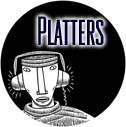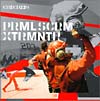
Comment
on this story
|
 |

This week: The politics of dancing and Johnny Cash's ghosts
Primal Scream

Xtrmntr (Astralwerks)
Nine years ago, the mad Scot and the ramshackle entourage known as Primal Scream released a hookah cloud called Screamadelica, a daisy-brained stew of Rolling Stones riffs, clattering acid house piano, Peter Fonda samples, and dubby dreamscapes. While their U.K. rock peers were busy grafting dance beats onto anything that moved (and a lot of things that didn't), the Screamers went all the way down the rabbit hole and emerged with a deceptively simple manifesto: a groove is a groove is a groove. They played dance music like it was rock 'n' roll because, duh, it was rock 'n' roll. Screamadelica seems only more artful in retrospect, because even after Gillespie and co. laid down the blueprint, nobody else has ever gotten it right.
Now, following 1997's darkly brilliant Vanishing Point, a long night's drive of an album, we get Xtrmntr. There's spaciness here, as before, but it's all dark matter. The Scream collective is tuned in and turned off. Where Screamadelica was a bliss-by-way-of-oblivion opus (see: "Loaded," "Higher Than the Sun," etc.), Xtrmntr is aggressively engaged. The cover shows fighter pilots, the first song is called "Kill All Hippies," and on the title track Gillespie half-mutters, "You think you're free, but you ain't free." He has seen the New Britain, and it sounds a lot like Bill Clinton's America: glib liberalism, free market pirateering, and blood on everyone's hands. "You've got the money, I've got the soul," he taunts, but in this world, everything has a price.
Not surprisingly, the music is a lot more jagged this time around, spiked with scuzzy guitars and more beats per minute in some songs than you can find on all of Screamadelica. Then again, My Bloody Valentine's Kevin Shields gets all free-jazzy in his reworking of "If They Move, Kill 'Em," and the Adrian Sherwood/David Holmes collaboration "Keep Your Dreams" is a rumbling fatalistic lullaby.
When Gillespie gets around to calling himself "five years ahead of my time" on the last track, you want to believe him. It's the one time on this marvelously angry album that you can even imagine a future.
—Jesse Fox Mayshark
Johnny Cash

Love, God, Murder (Columbia)
When I think of Johnny Cash, I always think of Robert Mitchum in The Night of the Hunter—the crazed preacher with "Love" and "Hate" tattooed on his knuckles, spouting hellfire and chasing innocents (and innocence). The "Love" usually wins out for Johnny, but just barely. When he sings about killing a man in Reno just to watch him die, it sounds like it's his way of getting the poison out of his system—saying it instead of doing it.
The title of a new three-disc compilation sums up his abiding concerns about as well as anything could: Love, God, Murder. With one disc accorded to each topic, it seems like a nicely balanced approach—except that Johnny Cash's recordings have been anything but nice and balanced. His sparse work for Sun Records in the late '50s established him as the rightful heir to Hank Williams; he spanned the same extremes of haunted loneliness ("Folsom Prison Blues") and aw-shucks sentimentality ("Ballad of a Teenage Queen"). But his output got more sporadic as he went along. So by drawing from his entire career, the new collection (chosen by Cash himself) spreads the best stuff a little thin.
There is greatness here, of course: "I Walk the Line," "The Long Black Veil," "Ring of Fire," even some of the selections from his mid-'90s comeback albums. And Cash's deep cave of a voice, the one thing that has never failed him, puts a little dark heart in even the most treacly ballads. But there's a lot missing: "Big River," "Get Rhythm," "Guess Things Happen That Way," "The Ballad of Ira Hayes," and many others, presumably because they're either not Johnny's personal favorites or—more likely—because they didn't fit neatly into the set's trinity of themes. And there's no denying that, however heartfelt his faith, Cash is a more convincing singer and writer when he's wrangling with the weakness of the flesh than with the nobility of the spirit, which makes the middle disc marginal. All in all, it's an interesting collection from an artist who demands an essential one. (My review copy didn't include the liner notes by Bono and Quentin Tarantino, for which I'm thankful. Consider yourselves warned.)
On the other hand, the new reissue of Cash's 1969 concert at San Quentin Prison is vital in every sense of the word. With the Carter sisters and Statler Brothers in tow, and feeding off the barely contained energy of the inmates, Cash is by turns ferocious, witty, and deeply sincere. When he rolls out a new song called "San Quentin," the crowd loves it so much he promptly tears into it again. This expanded version of the recording includes the cuss words left off of the original, along with fiery stage banter and electrifying renditions of "I Walk the Line," "Big River," and more than a dozen other classics. He and the Tennessee Three play "Wreck of the Old 97" with an almost punk-rock frenzy that leaves most modern alt.country types sounding anemic by comparison. If you're only going to buy one Johnny Cash CD this year, go with San Quentin.
—JFM

June 8, 2000 * Vol. 10, No. 23
© 2000 Metro Pulse
|